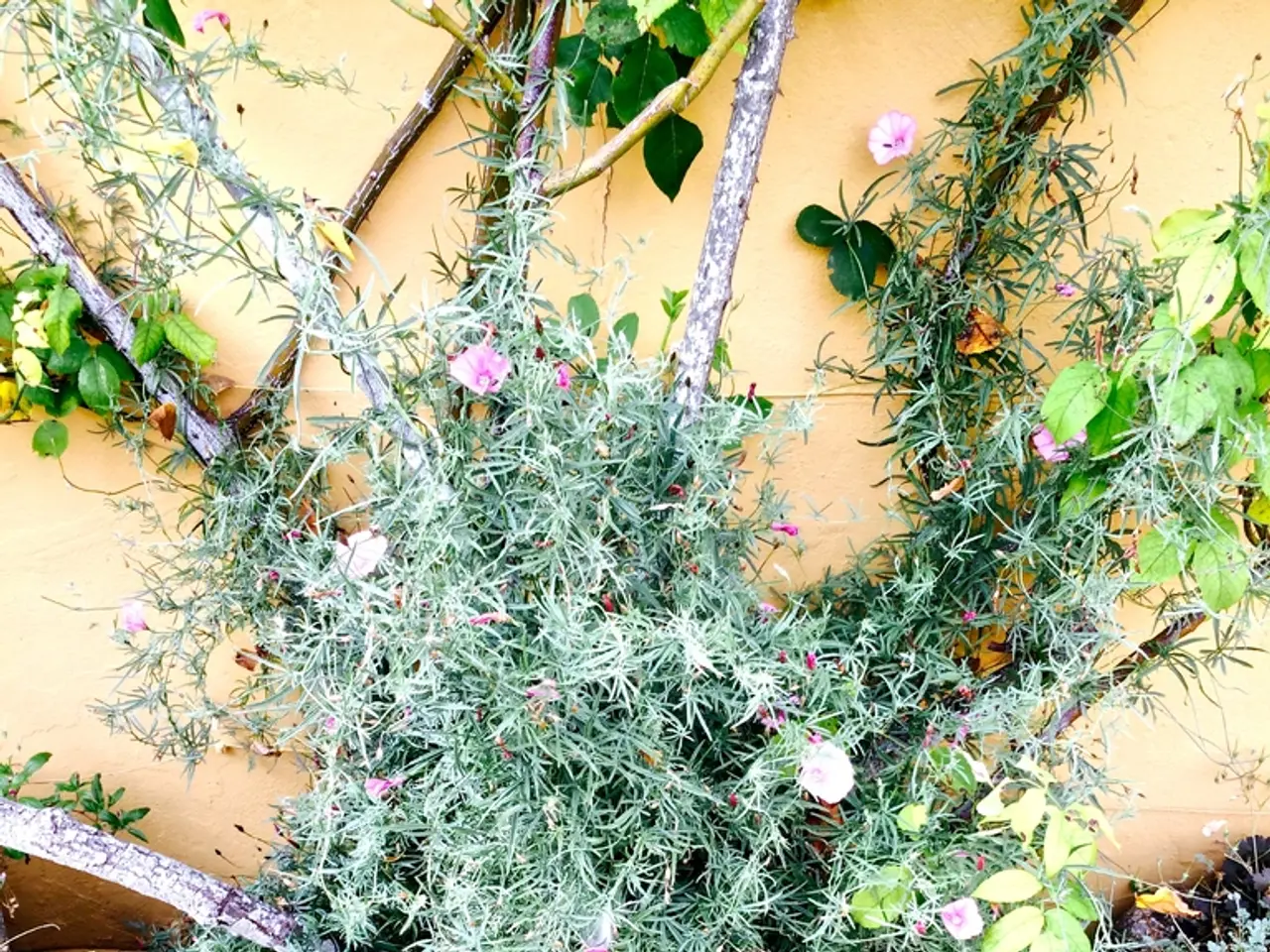Hindu Mythological Plants with Divine Connections: An Overview of 5 Notable Species
Hinduism's Sacred Trees: A Symphony of Healing, Spirituality, and Mythology
In the rich tapestry of Hindu culture, several trees hold profound significance, weaving together medicinal, spiritual, and mythological threads. Among them, Tulsi, Sandalwood, Neem, Banyan, and Peepal trees stand as beacons of healing, purity, and divine protection.
Tulsi: The Incomparable One
Tulsi, also known as Holy Basil (Ocimum tenuiflorum), is a plant of immense reverence in Hindu culture. Often grown in courtyards and worshipped daily, Tulsi combines medicinal, spiritual, and mythological significance.
Medicinal Properties
Extensively valued in Ayurveda, Tulsi is an adaptogen, helping the body adapt to stress by balancing systems like the immune, digestive, and nervous systems [1][3][5]. It boasts antibacterial, antiviral, antifungal, and antioxidant properties due to essential oils like eugenol and limonene [5]. Rich in vitamins A and C, calcium, zinc, iron, and magnesium, Tulsi supports bone health, immunity, and overall wellness [3][5]. Traditionally, Tulsi has been used for treating respiratory issues, managing blood sugar levels, lowering cholesterol, calming the mind, supporting gut health, and promoting longevity [1][3][5]. The whole plant—leaves, stem, flowers, roots, seeds, and oil—is considered medicinally valuable and employed in teas, oils, and poultices [1][5].
Spiritual Properties
Regarded as sacred, Tulsi is considered a plant that nourishes the body and spirit, helping to calm the mind and promote inner balance [1][2]. Recognized for its purifying and cleansing capabilities, it is used in rituals and prayer to create a spiritually elevated and protected environment [2].
Mythological Properties
The name Tulsi in Sanskrit means "The Incomparable One" and is linked to the goddess Tulasi, who symbolizes love and protection. Tulsi is often called "The Queen of Herbs" and "The Mother Medicine of Nature" due to its revered status and mythological association with divine attributes [1]. According to Hindu mythology, Tulsi is a manifestation of the goddess Tulasi, believed to protect devotees and bring spiritual blessings [4]. Its presence in homes is believed to invite divine grace and protect the household from negative energies [4].
Sandalwood: A Fragrant Symbol of Purity
Sandalwood is known for its fragrant wood, which is used in the creation of incense, perfumes, and sacred offerings. The Sandalwood tree (Santalum album) is considered sacred and associated with Goddess Parvati.
Neem: The Village Pharmacy
The Neem tree (Azadirachta indica) is a sacred plant deeply linked to Lord Shiva in Hinduism, often referred to as the "village pharmacy" because of its numerous medicinal properties. Believed to possess purifying, healing, and protective qualities, it is believed that Lord Shiva meditated under the Neem tree to gain spiritual strength and enlightenment.
Banyan: A Tree of Immortality
The Banyan tree (Ficus benghalensis) is associated with Lord Krishna, the god of compassion, tenderness, and love. Its expansive nature and long lifespan are symbolic of divine grace. The tree is often depicted as providing shelter and protection to the devotees.
Peepal: The Tree of Life
The Peepal tree (Ficus religiosa), also known as the Banyan Fig, is highly significant in Hindu mythology and associated with Lord Vishnu. The tree's leaves, bark, and roots are used in various traditional practices and remedies. The Peepal tree is believed that Lord Vishnu resides under its shade, and offering prayers under this tree can bring divine blessings and remove obstacles. The Peepal tree is associated with Lord Shiva, as it is said that Lord Shiva meditates under its shade. The tree is considered highly auspicious and worshipped for its ability to bring blessings of health, prosperity, and protection.
In the realm of Hindu culture's revered plants, Tulsi, Sandalwood, Neem, Banyan, and Peepal trees stand as symbols of healing, purity, and divinity, weaving together medicinal, spiritual, and mythological threads. Featured in courtyards and daily worship, Tulsi embodies medicinal, spiritual, and mythological significance, blending seamlessly into one's lifestyle. A staple in Ayurvedic medicine, Tulsi plays a crucial role as an adaptogen, balancing the body's systems, and showcasing antibacterial, antiviral, antifungal, antioxidant, and nutrient-rich properties.
Sandalwood, celebrated for its fragrant wood, serves in the creation of incense, perfumes, and spiritual offerings, embodying a symbol of purity. The Neem tree, deeply connected to Lord Shiva, is often referred to as the "village pharmacy" due to its numerous medicinal properties, renowned for its purifying, healing, and protective qualities.
As a sacred symbol, the Banyan tree, associated with Lord Krishna, represents divine grace through its expansive nature and long lifespan, offering shelter and protection. Lastly, the Peepal tree, associated with both Lord Vishnu and Lord Shiva, is believed to reside beneath, bringing blessings of health, prosperity, and protection, while offering prayers can remove obstacles. The sacred trees woven into Hinduism's tapestry not only contribute to personal growth and mindfulness but also enrich the home-and-garden sector with fashion-and-beauty and education-and-self-development dimensions.




